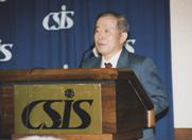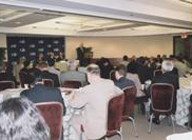May 26, 2004
| Date | May 26, 2004  |
|---|---|
| Venue | Center for Strategic and International Studies (CSIS) 1800 K Street, NW, Washington, D.C. 20006 TEL 202-457-8748 FAX202-835-3899 |
| Sponsors | Japan Economic Foundation (JEF) Center for Strategic and International Studies (CSIS) |
| Topics | Session 1: Evolving U.S.-Japan Relationship Session 2: Political and Security Challenges in Iraq Session 3: Challenge for Economic Reform and Development |
Chairman's SpeechNoboru Hatakeyama Chairman and CEO Japan Economic Foundation
I'd like to express my heartfelt gratitude to Dr. Hamre and CSIS for co-organizing this conference entitled Reconstruction of Iraq, U.S.-Japan Cooperation and the Implications for Future Bilateral Relations with the Japan Economic Foundation, JEF.
Also I'd like to extend my gratitude to the participants and audience in this conference. Participants include, for example, Ambassador Samadi [ph] from Indonesia to Washington, D.C. He used to be the Ambassador to Japan. I enjoyed a very good friendship with him.
Also, Ambassador McCormick is here. He has been a long-time friend of mine and our relationship started from a common experience at not CSIS but SII -- Structure Impediment Initiative.
So I'd like to extend my gratitude to them.
JEF is a non-profit organization whose mission is to disseminate information regarding Japan. For this purpose JEF has been publishing a bi-monthly English magazine by the name of Japan Spotlight since 1980 and co-organizing international conferences like this with other organizations of foreign countries.
Today the conference is one of them, and this is the second such conference co-organized by CSIS and JEF in Washington, D.C.. The first one was held last October to discuss the Chinese economy including the issue of the Renminbi.
To reconstruct Iraq Japan has been and will be implementing three measures. Firstly, the GOJ has committed to give ODA, official development assistance, to Iraq. The amount of ODA will total $5 billion between 2003 and 2006, with $1.5 billion in grants and $3.5 billion in very low interest rate loans. Roughly two-thirds of the grants have already been implemented.
The second measures is debt forgiveness, debt relief Japan will offer to Iraq. Among developed countries that have outstanding official credits to Iraq, Japan has the biggest arrear the amount of which is $4.1 billion, excluding compensation claims for delayed repayments. If we include that amount the amount will double.
Prime Minister Koizumi told Mr. James Baker, Special Envoy to the President of the U.S., that Japan would commit to substantially curtailing its official credits to Iraq in the Paris Club creditors meeting if other countries like Russia and France are prepared to do the same.
The third measure is the dispatch of JDF to Iraq.
The fact that Japan has engaged in the three issues is itself clear evidence that Japan is cooperating with the U.S. in the Iraqi war.
The purpose of this conference is to find how we can cooperate with each other in implementing these measures and what else Japan and the U.S. can do to rebuild Iraq.
For example, if the U.S. can improve the security situation in Iraq Japanese companies will be able to help reconstruct Iraq and may be able to bid as subcontractors for U.S. projects. Likewise there may be scope for American companies to participate in Japanese projects.
If we can come up with some specific ideas like this through our discussion today it would be highly appreciated.
Once again, thank you very much indeed for co-organizing and participating in this conference, and especially my gratitude goes to Ambassador Yanai who has come all the way from Tokyo with me yesterday and he is now a professor at the Chuo University. Thank you very much indeed.
ParticipantsMay 26, 2004List
SummarySummary
2017. JULY 2016. JUNE 2015. SEPTEMBER 2014. DECEMBER 2013. OCTOBER 2013. FEBRUARY 2011. NOVEMBER 2010. OCTOBER 2010. JANUARY 2008. DECEMBER 2007. NOVEMBER 2006. OCTOBER 2006. JULY 2005. SEPTEMBER 2004. MAY 2003. OCTOBER
